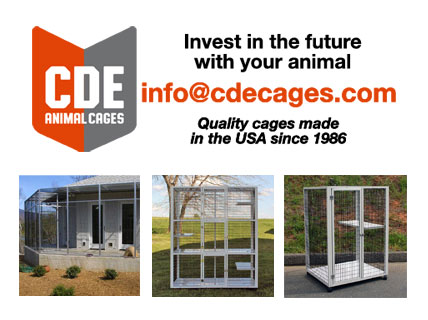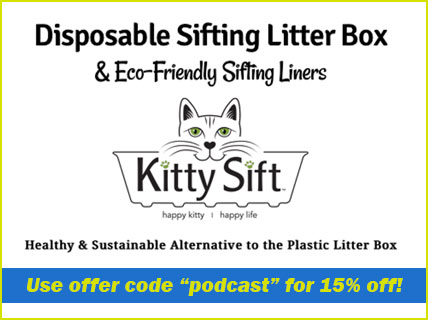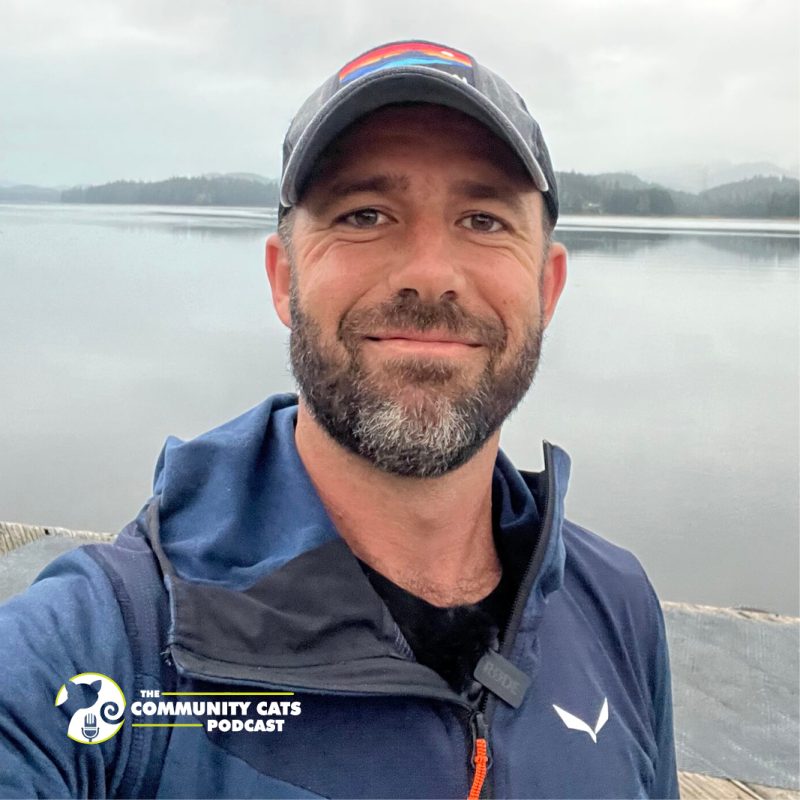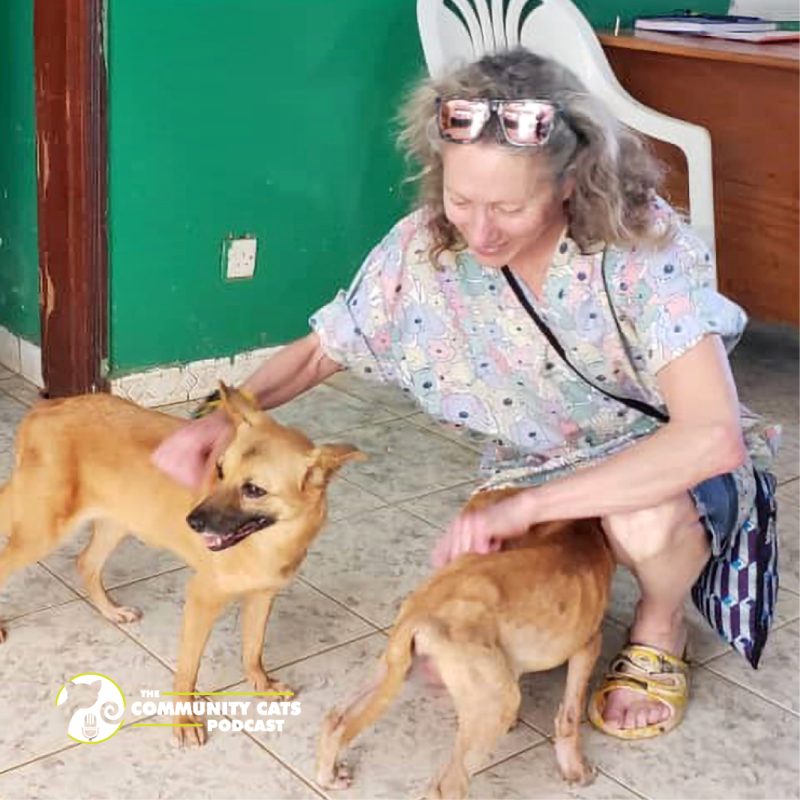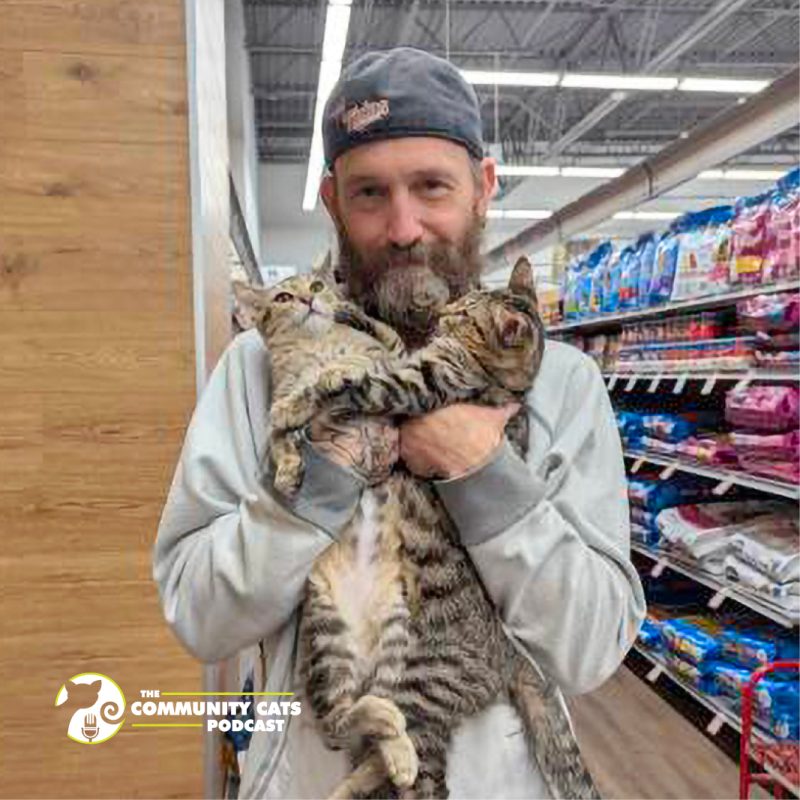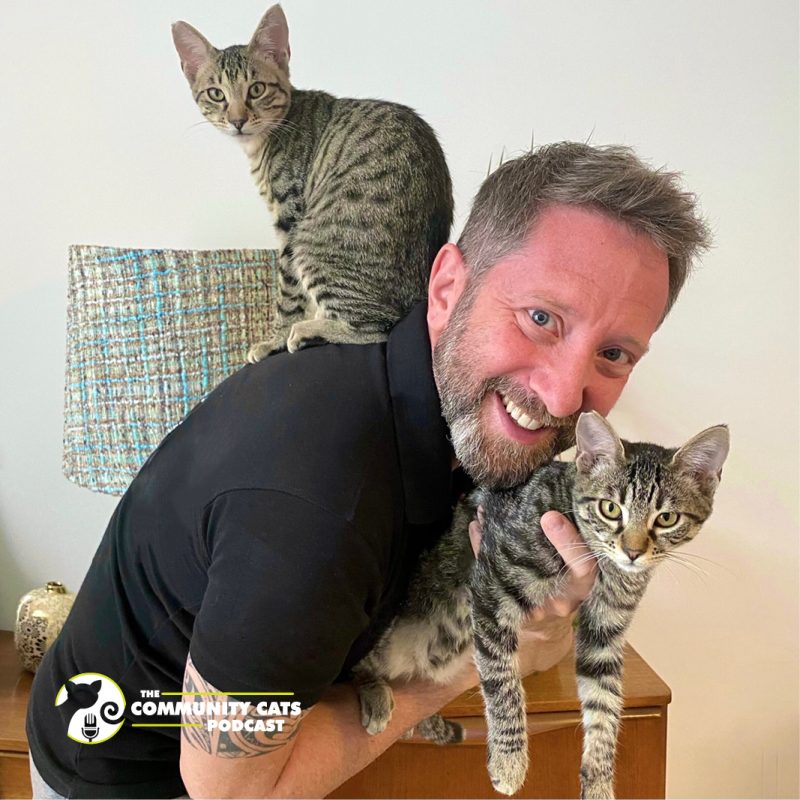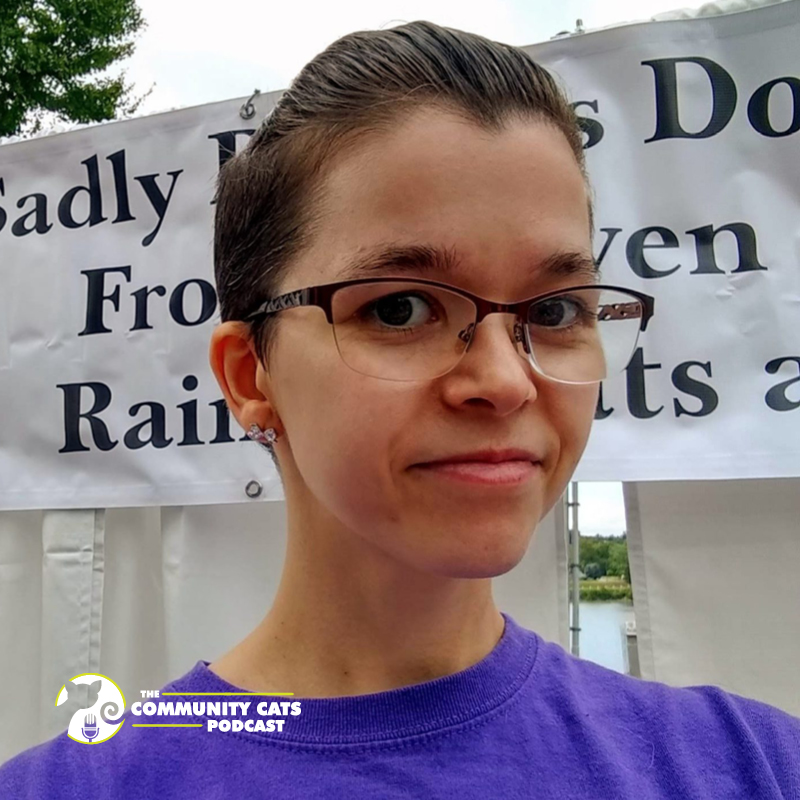
Mikaela Fleisher, PennyFix
January 12, 2021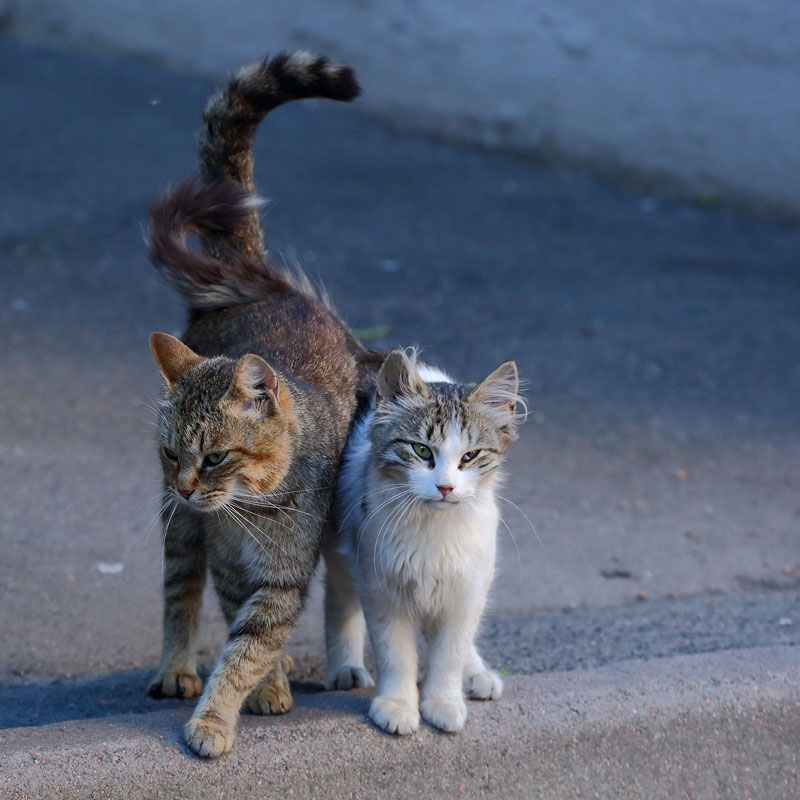
We Can Do Better Than Lethal Control of Outdoor Cat Populations
January 21, 2021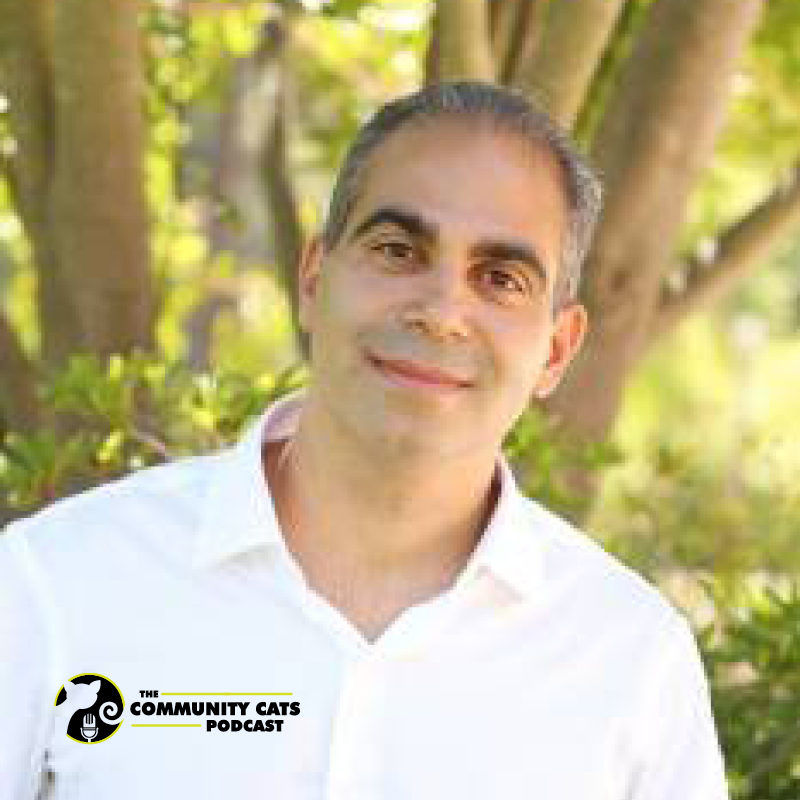
“I was just really fed up with healthcare, not as a physician, but with the structural mechanisms of how healthcare operates, and really focused in on what was happening with insurance”
Listen to Episode #387 Now
This episode is sponsored in part by Doobert.com.
Our guest this week, Allen Kamrava, has an impressive and widely varied resume focused on both business and medicine. Dr. Kamrava is a colorectal and general surgeon and the founder and CEO of Eusoh, a powerful platform working to change the insurance industry by helping pet owners afford their vet bills.
Eusoh is an online community of pet lovers committed to helping each other with unexpected vet bills. It is an alternative to pet insurance, which Dr. Kamrava notes, only about 1% of pet owners have, though 67% of Americans have a pet in their household.
Stacy and Dr Kamrava talk about how Eusoh is committed to creating a more transparent and efficient system, reducing economic euthanasia, and building partnerships with employers to offer Eusoh memberships to employees in benefit or perks packages.
To find out more, or to get signed up, visit Eusoh’s website.
Read Episode #387 Now
Kristen Petrie [00:00:02]
You’ve tuned in to the Community Cats Podcast. Ready? Let's go.
Stacy LeBaron [00:00:13]
Welcome to the Community Cats Podcast. I am your host, Stacy LeBaron. I've been involved helping homeless cats for over 20 years with the Merrimack River Feline Rescue Society. The goal of this podcast is to expose you to amazing people who are improving the lives of cats. I hope these interviews will help you learn how you can turn your passion for cats into action. Today, we're speaking with Allen Kamrava. Allen is the founder of Eusoh.com, a pet care community. With graduate degrees in both business and medicine, Allen has maintained dual exposure throughout his career. He has extensive management experience, having been acting VP at a multibillion-dollar real estate company, a consultant for an international risk management consulting firm and has worked for Deloitte. He has instructed surgical residents at Cedar Sinai, published books, journals, and textbook chapters, and has spoken at several international conferences. Caring for his community in multiple ways, Allen serves on numerous boards, while simultaneously curing cancer as a surgeon. His breadth of experience in health care and management provides him a uniquely well-rounded perspective on how to tackle the uber complex field of insurance. Allen is an amateur triathlete residing in Los Angeles with his wife and four children. Allen, I'd like to welcome you to the show.
Allen Kamrava [00:01:32]
Well thank you for having me. That was a great intro. Thank you.
Stacy [00:01:35]
So, people will be like, well, what are we doing here with Allen? He does all this other stuff, but we haven't talked about, you know, pets so much. But Eusoh is all about pets. So, we're going to get to it, we’ll get to the reason why we have Allen here, even though I have all these lists in my mind. I was like, oh I can ask him for help on this and I can ask him for help on this because it sounds like Allen you are a tremendous problem solver, and that's great. But before we dive right in, tell me your experience around pets and your pet ownership, and why you love them so much.
Allen [00:02:30]
Yeah, actually. We're Persian, and the traditional kind of heritage in the Mideast, they actually look down on animals. So, I grew up with two parents that absolutely hated animals and I think I became that reflexive opposite, you know, when you do the complete opposite of what your parents tell you. So, I actually have loved, I’m more of a dog person, but our number two in the company is the cat fanatic, Ari Simon. So together he and I really set everything up when we founded this company. And so, between the two of us, you had Ari’s cat passion and my dog passion. We had a German Shepherd, most recently, that with our fourth, we could not give him the attention he needed at all. And so, we rehomed him to a family that had, was able to give him full attention. So currently we are pet less but that will change pretty soon as our child is getting older and requiring a little bit less attention. So, we could split our focus for what I think is appropriate for having an animal in the house.
Stacy [00:03:22]
So, I’m just gonna dive right into this conversation because I am so intrigued in understanding more about your model here. What is Eusoh and how did you develop it?
Allen [00:03:34]
At its core, and you know what they say, is that what's that elevator pitch that everyone always asks you. At the core it's pretty simple, it's just, it's an online community of pet lovers, dogs, and cats together, that have all committed that on an ongoing basis, if any of the members have an unexpected vet bill, that they'll split it with one another. And the goal was to give something in lieu of insurance, that's different than insurance, that is more affordable but also more transparent
and clear to the users. And so that's at its core. The foundation of where it all came about was, I was in my medical practice operating as a colorectal surgeon, and as any, at least anyone in the U.S. listening to this could understand, was just really fed up with healthcare, not as a physician, but the structural mechanisms of how healthcare operates, and really focused in on what was happening with insurance. And really, the first year of what we had set out to do with Eusoh, was actually all human focused.
You know, if we really become successful and become one of those companies where they look at the first decks that we used, when we started bringing money into get this live, it was all about fixing human health care. About a year into it some of our big companies that we were involved with really came back and said, look, you’re going after a behemoth, and they can really take you guys down and let's take an about-face and look at what we can do with this, because you have something here that is real and is really going to help people. But if some of these big health insurers come against you, there's no regulator that you're going to be able to fight. And so, we ended up happening into pet, not, my central thesis was we wanted a model that can really fix the concept of how do people afford care, and we realized that pet had a lot of the similarities of what we were seeing in the health market, yet without necessarily the full corruption. But there was a major gap. Sixty-seven percent of Americans do have a pet in their household, what was actually less than one percent at the time, now it's two percent, but less than one percent of people actually had coverage and economic euthanasia of pets is a real thing. And so, we found something that we felt we could continue to be passionate about but had all the complexities and the realities of what we wanted to solve for. And that's really where it kind of started to come out that this is the right place for us to put this and apply this kind of model.
Stacy [00:05:49]
Yeah, so I live in Vermont, I'm up here in Vermont recording, so I'm very familiar with the co-operative model. Is this similar to a co-operative?
Allen [00:05:57]
It is, it has a lot of similarities to co-operatives. There's similarity. So, similarities to co-operatives, similarities to mutuals and then similarities to, some people may have heard on the radio there, or even in the Midwest, there's health share ministries. So, similarities but yet different. When I started to do it, what really what had happened was, I got, there's one night I just got so frustrated dealing with the insurance companies. I actually downloaded all the populations that I could find on the CDC's website. This is probably circa, 2014 – 2015, and I just started playing with numbers. And a lot of things started to dawn on me, but the first one and, I guess most salient to this conversation, was that insurance companies are just big crowd funders. They're really just big GoFundMe campaigns but with a model that was built, a hundred years before the telephone came into existence. In that model that was built for a time to co-mingle funds across a lot of strangers, but when there's no telephone to chase the money, that model is still the same model we're working on. And so, it's an antiquated model that has never changed to all the new advances we've had in technology, even with the telephone. And that realization is what we really started to see that was well, if we start taking the best in tech, can we actually make it a much more efficient, cleaner, and transparent model, and just everything we've looked at said, yes, yes, yes, yes, across the board. It's just nobody had, I don't know, I don't want to give myself too much credit, but the guts to go up against these big, corporate giants. People don’t realize, but insurance is probably one of the biggest industries globally. It's a four and a half trillion-dollar industry. And so, it's entrenched, people are terrified of going against these guys. And I've never let that stop me and I said, let's do it. We have something here. It makes sense. So why not do it? It could, it could solve a lot of problems for a lot of people.
Stacy [00:07:39]
And for insurance now, I mean, it's actually, it's kind of interesting because, you know, for folks that do have insurance that is involved with their workplace. Do you feel people actually are fully aware of, you know, what the costs and the coverages are and all that kind of information?
Allen [00:07:55]
Not at all. And that's actually one of our biggest challenges, as a brand, is a lot of people come to us, so what you're doing is so complex, it's very hard to understand, and the reality is, it's not complex. What we've told people is, we've built a place where we have a community of people, they are all in a hundred percent, any month you have a bill, you will get that reimbursed by the group. But the reason it's complex is because, exactly to what you said, Stacy, is people don't even understand insurance at its core as it is, but we accept it at face value because it's standardized. And so, whatever it is, it’s standard across all products and lines,
be it your car, or your cell, phone, or health, or cat. There's deductibles, there’s coinsurance. It's all standardized. And so, whatever it is, we just accept it at face value, but we don't look at it. We're giving something new and so people are looking at it to try to figure it out because it is new. And that little thing makes it seem like what we're doing is very complex when really it actually is very simple in methodology.
Stacy [00:08:53]
And how are you ensuring that for whatever dollars you're putting in, that it's not going to overwhelm people? I mean, I would assume say, I guess the scale is the issue. You want to have X amount of people in there so that then the variables aren't that different.
Allen [00:09:10]
Yeah. It's exactly that. So, it's scale. One of the things that's interesting with pet, so for cats and dogs, is unlike healthcare for instance, which it's open enrollment, so people all join at the same time and then they renew at the same time. There's something critical to that and this goes back to your complexity is, it means that people's deductibles and healthcare reset all at the same time. And so, one of
the things that happens in human health care is there's a massive spike in spending by doctors and hospitals towards the end of everybody's policy, when people's deductibles are done. And so, health care is very spikey. For cats and dogs, very different because people are just signing up when they feel like it and when you have a large enough scale, what that generally means is that by and large, surgery, you know, anything that happens to animals overall just spreads evenly through any population. And there's not that spikiness. And so, before we went live, one of our partners, which is Willis Reed, one of the largest reinsurance brokerages in the world, they've done a very deep analysis. It came back and said, you've built something that's real and will work, and the savings are huge, but they helped us calculate what those costs would be. So, they actually looked at over a hundred thousand loss points for cats and dogs across the UK, the US and Australia. And they set our pricing, based off that data, and they said, we are at a ninety-five percent confidence level that you will never need in any month more than this much and across the community, to cover vet expenses, given that. And so that's where that had come from.
Stacy [00:10:39]
So, how much does this cost a person to join?
Allen [00:10:42]
So, our basic idea is and, I'll take a step back. One of the things that was driving me at least nuts on the insurance model was that insurance companies make their revenue as a percentage of a premium. So, let's say that an insurance company decides they need to make twenty dollars per premium, to just exist at a break-even, just to break even, and not even make a dollar profit, but they are by mandate, and its regulatory believe it or not, only allowed to take twenty percent of premium dollars to make that twenty. That means that no matter what they do, even if their actuaries say look, we only need sixty dollars a month to make this premium work, well, if it's at sixty, they can only make twenty percent of that, that’s twelve. And so, what they need to do is justify something for their actuaries, to say we really need premiums to be at a hundred so that we could even just break-even. So, the model is incentivized against the person they're trying to protect because of the way the revenue is, it's something that we call revenue is a model of throughput, which is not what you want is a consumer when you're being serviced. And so, what we said is, let's break all that up and start from scratch. And so, we split up the pricing and said, we as a company, are going to take a flat fee. Irregardless, if it's a zero-loss month or it's a billion-dollar loss month. It doesn't matter. We always want to take a flat fee so that we're agnostic to what's happening to our users. And so that we have no incentive ever to want costs to go up because it doesn't affect us. And so, we have two parts to our pricing. One is the flat fee that comes to us as a membership subscription fee, and that's flat. We take the same amount every month. And then the cost share. And so, our members split on costs after they happen. And so, no month is that the same. For cats on average, it's been about eight dollars a month. And so about eight dollars a month, our members contribute to the pool, some months it maybe a little more, some months less. There may have been a six-dollar month, and a ten-dollar month, but it averages out to about eight dollars a month for cats. And so, it's the combination of what they pay as a flat fee to be a member and then the sharing amount to the other users to care for their pets or their cats. And we don't touch that money at all. It actually doesn't even flow through our bank accounts, we've completely separated it. And so, it goes through a different company and then goes out to our users and we don't touch it. And that was by, on purpose by design, because we really wanted a clean system, where we never have a reason to want those costs to go up where it's like, it was a bad month for our users but guess what good month for us. That's not what I wanted us to end up at.
Stacy [00:13:21]
Yeah. I know the membership fee may change over time but is there a general ballpark figure of where that falls?
Allen [00:13:27]
So, the membership fee, what we're doing is, if somebody signs up at, at let's say seventeen, when we first launched it was actually at ten because we just had to get people on board and that wasn't a sustainable number, but anyone who signed up for us at ten is still at ten. So, but the point being that as the fee for the membership goes up, you, whatever you came in as and you're always locked in and through the life of your pet. The fees for sharing on with the pets really just has to do with what's coming through on the system. And it's really just a pure one hundred percent reflection on, these are the costs that came in from you and other members or the other people in the community for their cats. And this is what it's going to be to take care of them for this month. There's no fluff to that, it’s really a straight, just a vision of how much happens within the community this month and how much are we going to contribute. And so, we actually had one month where it was sixteen cents a member to share, and we had a month for, on the dogs’ side, it went up to thirty. On cats, it's never really been above the teens. Cats overall are much cheaper to care for than dogs.
Stacy [00:14:26]
And I would assume that your program covers basic things like vaccines and spaying and neutering, covers pretty much everything that the animal needs or is it only for select services?
Allen [00:14:38]
It's for most everything. Actually, for spaying and neutering, when we sat down as a team, we actually put out a list of every procedure. We actually got, from one of the veterinary hospitals on the east coast, we got their entire database of every procedure that they had in their hospital database, and we went through it. It took us two days as a team. We went line-by-line. Spaying and neutering, we ended up deciding not and the reason was that, the majority of animals coming into the system were coming from shelters and rescues pre-spayed and neutered. And so, we couldn't figure out a way that we thought it would ever be equitable for our community members to be sharing on spaying and neutering, when it was a cost that they one hundred percent would never have themselves. And so, for that reason, we held off on the spaying and neutering because we couldn't figure out a way to make that an equitable share across the community.
– Start mid-roll advertising-
Stacy [00:15:26]
Say goodbye to scooping. Say hello to a better litter box.
Introducing Kitty Sift, the eco-friendly waterproof litter box, made of recycled cardboard. Just lift, sift, and reuse. See it on Amazon or go to kittysift.com and use coupon code PODCAST, for fifteen percent off.
Stacy [00:15:46]
By now, you know how powerful the Doobert software platform is, facilitating everything from transport to fostering with just a few clicks, but did you know that the team at Doobert also provides consulting and custom software development for your organization's needs? The team at Doobert has extensive experience in website, design, SEO strategies, mobile application development and even advanced capabilities involving integration to social media and text messaging. Big or small, the team at Doobert can do it all. And because Doobert operates as a social enterprise, all of the revenue from their consulting services goes back into developing even more innovative and life-saving solutions for animal rescues around the world. So, if you are planning to increase your digital presence online, through a new website, or some SEO strategies or, if your organization is looking for an experienced web development team to support your operations, look no further than the team at Doobert. Reach out to Chris today at Chris@doobert.com and he'd be glad to discuss what you're trying to accomplish and how they can help.
Stacy [00:16:47]
Are you a fan of the online events we hold throughout the year? If so, here's something new from the Community Cats Podcast, for 2021. The Community Cats Pass, for discounted entry to all events throughout the year. Simply purchase this pass before the Online Cat Conference begins on January 29th, 2021, and we will automatically register you for all of our events in 2021. At just two-hundred twenty-five dollars for one device, the pass is a savings of at least eighty-five dollars over signing up for each event individually. Your pass includes access to the private Online Cats Conference Facebook page, VIP access to the Online Cat Conference, the Online Kitten Conference, the United Spay Alliance Conference, Behavior Day, Feline Leukemia Day, Fundraising Day, and our neighborhood cats Trapper Certification Program, plus access to recordings for all conferences that offer them. And, if we add in any more programs during the year, you will be invited to join those too, on us. Just visit communitycatspodcast.com before January 29th, to purchase your pass. And we’ll look forward to seeing you at our next online event.
-End mid-roll advertising-
Allen [00:17:55]
Yeah, so we do, we wanted it to be a comprehensive plan. So, office visit, wellness
visits, we don't have a limit on how many visits to the office. Medications are covered, alternative treatments. The ones that we typically don't do and, I don't want to get it wrong because it's, there is the list and we have it on our site, it's clear as day, is vaccines are included but certain flea and tick medicines aren't. We had started by doing that, but we quickly realized is that, as soon as you offer that, people get the best they can because why not? It's covered. And so, what it was doing was people were getting what everyone was getting and just passing the buck around the table.
And whenever you're in a situation where people are just passing the buck around the table, it just drives up costs for everybody. And so, it wasn't helping our members to offer those. It was just making everyone's monthly cost more. And so, we ended up taking that one back, but office visits, accidents, illness. And what we also do is for any pre-existing condition that you join. So, your animal could have a pre-existing condition, doesn't mean they can't join the platform, but what we do have everyone acknowledge is look, if I know my animal has a surgery coming up, it's not fair for me to join this platform and expect to have others to join this, having known that I'm going to have to pay for this ahead of time. If we did that, we quickly would become a place where people just join only to offset expenses that they know are coming and then leave. And so, the whole idea is, if you join and don't know about something, we will help you pay for that. But not to be something where people can try to take advantage of and put an expensive procedure that they know is coming up, to try to offset that expense.
Stacy [00:19:26]
Excellent. All right. Well, thank you so much for that information. That really is very helpful. My other question, too is, you know, I read an article a couple weeks ago about how because everybody has done the hashtag stay home and foster, and got a lot of new pets in homes, which is wonderful and great, that many employers are actually willing to pay for those adoption fees for those animals as an added benefit in their benefits package, basically, for the employees, which is a nice step.
It's a nice step to show that they're trying to include pets in the family model. So is Eusoh something that like a company would come to you and say, can we do a package for our employees and have it part of their benefits package?
Allen [00:20:11]
Yeah. It's actually our big push for 2020 and onward. We spent our first year, we went live, August-September of 2018. In that first year, there's no company that would work with our brand. They didn’t know who we were, it's a new model. It was unvalidated. And so, our first year or so was just people who really were those first early adopters that wanted to try something new and said I'll give it a shot. But what we've been able to build with that is really large brand partnerships starting to see our, and so our big thing now is really actually at exactly that level you're talking about, Stacy. We're doing a lot of work with benefit providers and HR managers, where they're offering this as something to their employees, as either a perk, if not a full-blown benefit. And so, we have companies offering it as perk, others, who are really just paying for the whole cost. But what they are seeing is there's a lot of data showing that a lot of people now, would actually prefer a pet benefit over a pay raise for instance. And that data has been consistent and voluminous. And so, a lot of companies are seeing that in there is this big push for adding pet benefits as a standard thing for most employment plans.
Stacy [00:21:15]
One question I forgot to ask, which is question for health insurance folks to is, are there specifics around who you go to? Or can you go to any veterinarian?
Allen [00:21:25]
You can go to any veterinarian. One of the things that, I'm going to relate this because it's easier for me to talk about it as a physician, so I'm going to relate it to because this the foundation of this concept came from my own experience as a physician. It never made sense to me that I had a patient, I treat colon cancer. So, if I had a patient come to me who needed a colonoscopy and I'm treating him for cancer, that the insurance would, I actually dealt with this a couple months ago, as I still treat patients, treated a really nice lady with colon cancer. Basically, long story short, I diagnosed it and we got her ready and then the insurance said we don't want you treating it, we want her to go to a small hospital with a generalist. And it took us two months of fighting and we ultimately were able to get it. That doesn't make sense to me. Ultimately, she has cancer, and the plan should say you have cancer, and this is going to be covered, period. And so there had to be a solution where somebody should be able to make a decision that if I need this being treated the diagnosis and the treatment is what matters. Why does it matter who the provider is? And so, what we did instead is said, well, if we can, give people all the information to make an informed decision, then that changes the equation. We all know in healthcare, no one knows what anything costs, myself included. When I did that lady’s surgery, I actually still don't know what they're going to pay me. I haven't got that payment back. We did it a few weeks ago, I'll find out in a few months. I had no idea. There's no clue, there's no transparency. So, on our platform, there's actually a service pricing list and that's searchable, and it has that entire database that I had sent from the veterinary hospital. We voted that in. And then we went, and we actually farmed for four months, every pricing point from every veterinary office, you find for what these costs are as a menu pricing. And then our platform every night as expenses, come through in our system, and we've had tens of thousands of expenses at this point, re-updates that data every day. It says, this is on average, what people are paying across the country. And that's what our community reimburses at basically, that average price. And what we have found is that about ninety percent of veterinary office charge about the same thing. And so, it covers ninety percent out there, but what it does provide for people is there's never a, you can't go to this vet so we're not paying you. You can go to any vet you want, you'll get reimbursed on what we show you ahead of time before you go. There maybe a little bit of a delta, but it's not binary as the network model is. The network model is zero, or all of it, ours is, it's always going to be what everyone's paying so they're sharing equally. And if there's a little bit of delta sure, but you also knew about that ahead of time.
Stacy [00:23:59]
Excellent, got all my questions answered here. If people are interested in finding out more about Eusoh, how would they do that?
Allen [00:24:07]
The easiest way is the website, its Eusoh.com. And it's “Eu” like Europe, I always tell people “Eu”, and then just Eusoh. So Eusoh.com., I think is the best way. We're always working on the best ways to explain the message without overcomplicating it and we still haven't perfected that. We've tried very dumbed-down websites and people said not enough, info. And then we put too much information, they said too much info. So, there's a balance that we're still working on achieving ourselves.
Stacy [00:24:34]
Allen, is there anything else you'd like to share with our listeners today?
Allen [00:24:38]
Most of it, you know, you asked really well, Stacy. I would just say that the full intention of what we built with this was really, how do we build a system that takes the best in technology and actually reinvents the idea of coverage? And we really did it methodically. We didn't launch, we actually spent a, over a year on building the model with really big partners before we wrote the first line of code. And so, we perfected kind of the concept and then only started designing the actual code to the website and taking it out. So, we built it based off of a really diligent process.
Stacy [00:25:11]
Excellent. Allen, I want to thank you so much for agreeing to be a guest on my show, and I hope we'll have you on again in the future. It sounds like they've got some great growth prospects here.
Allen [00:25:20]
Well, thank you. It was a real pleasure. I appreciate the time.
Stacy [00:25:24]
That's it for this week. Please head over to Apple podcasts and leave a review. We love to hear what you think, and a five-star review really helps others find the show. You can also join the conversation with listeners, cat caretakers, and me on Facebook and Instagram. And don't forget to hit follow or subscribe on Spotify, Apple podcast, Google podcast, YouTube, Stitcher or wherever you listen to podcasts, so you don't miss a single show. Thanks for listening and thank you for everything that you do to help create a safe and healthy world for cats.

